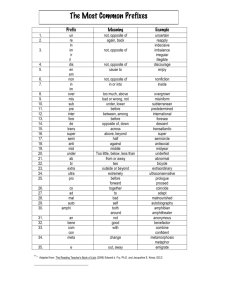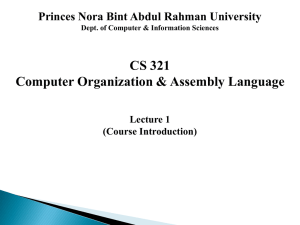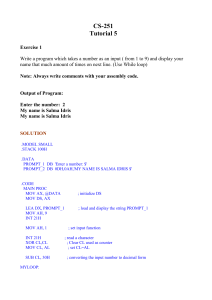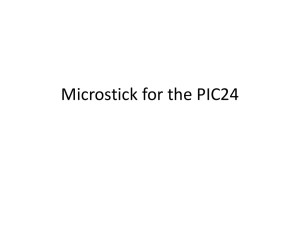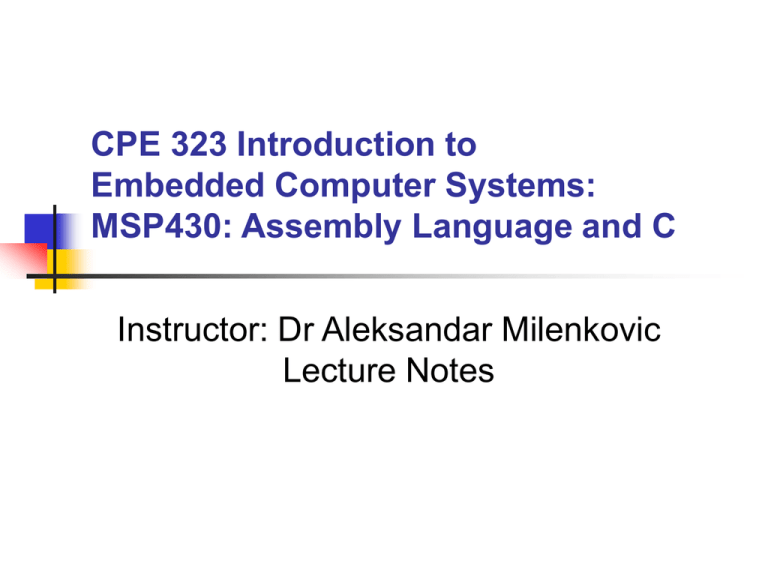
CPE 323 Introduction to
Embedded Computer Systems:
MSP430: Assembly Language and C
Instructor: Dr Aleksandar Milenkovic
Lecture Notes
Outline
Assembly Language Programming
Subroutines
Adding two 32-bit numbers (decimal, integers)
Counting characters ‘E’
CALL&RETURN
Subroutine Nesting
Passing parameters
Stack and Local Variables
C and the MSP430
CPE 323 Intro2EmbeddedSystems
2
Assembly Language Programming:
Decimal/Integer Addition of 32-bit Numbers
Problem
Write an assembly program that finds a sum
of two 32-bit numbers
Data:
Input numbers are decimal numbers (8-digit in length)
Input numbers are signed integers in two’s complement
lint1: DC32 0x45678923
lint2: DC32 0x23456789
Decimal sum: 0x69135712
Integer sum: 0x68adf0ac
Approach
Input numbers: storage, placement in memory
Results: storage (ABSOLUTE ASSEMBLER)
Main program: initialization, program loops
Decimal addition, integer addition
CPE 323 Intro2EmbeddedSystems
3
Decimal/Integer Addition of 32-bit Numbers
/*-----------------------------------------------------------------------------* Program
: Program demonstrates addition of two operands lint1 and lint2.
*
Operands are first interpreted as 32-bit decimal numbers and
*
and their sum is stored into lsumd;
*
Next, the operands are interpreted as 32-bit signed integers
*
in two's complement and their sum is stored into lsumi.
* Input
: Input integers are lint1 and lint2 (constants in flash)
* Output
: Results are stored in lsumd (decimal sum) and lsumi (int sum)
* Written by : A. Milenkovic
* Date
: September 10, 2008; Updated September 14, 2009
* Description: MSP430 IAR EW; Demonstration of the MSP430 assembler
*-----------------------------------------------------------------------------*/
#include "msp430.h"
lint1:
lint2:
lsumd:
lsumi:
; #define controlled include file
NAME
main
; module name
PUBLIC
main
ORG 0xF000
DC32 0x45678923
DC32 0x23456789
;
;
;
;
;
ORG
DC16
; set reset vector to 'init' label
0xFFFE
main
ORG 0x0400
DS32 1
DS32 1
make the main label visible
outside this module
move location pointer to 0xF000
operand1
operand2
; allocates space for lsumd (2 words)
; allocate space for lsumi (2 words)
CPE 323 Intro2EmbeddedSystems
4
Decimal/Integer Addition of 32-bit Numbers
(cont’d)
main:
ldeca:
ORG 0xE000
NOP
MOV.W
#WDTPW+WDTHOLD,&WDTCTL
MOV #lint1, R4
MOV #lsumd, R8
MOV #2, R5
CLR R10
MOV 4(R4), R7
MOV R10, R2
DADD @R4+, R7
MOV R2, R10
MOV R7, 0(R8)
ADD #2, R8
DEC R5
JNZ ldeca
;
;
;
;
;
;
;
;
;
;
;
;
;
;
;
starting address of the program
main program
Stop watchdog timer
pointer to lint1
pointer to lsumd (decimal sum)
R5 is a counter (2 words)
clear R10 (used as a backup for SR)
load lint2 (@R4+4) into R7
bring original R2
decimal add to lint1 (@R4)
backup R2 in R10
store result back into lsumd
R8 points to the next word in lsumd
decrement R5
jump if not zero to ldeca
CPE 323 Intro2EmbeddedSystems
5
Decimal/Integer Addition of 32-bit Numbers
(cont’d)
lia:
MOV #lint1, R4
MOV #lsumd, R8
MOV #2, R5
CLR R10
MOV 4(R4), R7
MOV R10, R2
ADDC @R4+, R7
MOV R2, R10
MOV R7, 4(R8)
ADD #2, R8
DEC R5
JNZ lia
;
;
;
;
;
;
;
;
;
;
;
;
pointer to lint1
pointer to lsumd
R5 is a counter
clear R10
load lint2
load original SR
add lint1 (with carry)
backup R2 in R10
store result into lsumi (@R8+4)
update R8
decrement R5
jump if not zero to lia
JMP $
; jump to current location '$'
; (endless loop)
END
CPE 323 Intro2EmbeddedSystems
6
Assembly Language Directives
b1:
ORG 0xF000
DB
5
tf
;
;
DB
-122
;
DB
10110111b
DB
0xA0
;
DB
123q
;
EVEN
;
EQU 25
w1:
DW
32330
w2:
dw1:
DW
DL
-32000
100000
dw2:
dw3:
dw4:
s1:
s2:
DL
DL
DL
DB
DB
b2:
b3:
b4:
b5:
allocates a byte in memory and initialize it with constant 5;
equivalent to DC8 5
allocates a byte with constant -122
; binary value of a constant
hexadecimal value of a constant
octal value of a constant
move a location pointer to the first even address
; allocates a a word size constant in memory;
; equivalent to DC16 32330
; allocates a long word size constant in memory;
; equivalent to DC32 100000
-10000
0xFFFFFFFF
tf
'ABCD'
; allocates 4 bytes in memory with string ABCD
"ABCD"
; allocates 5 bytes in memory with string ABCD
; and \0 character at the end
CPE 323 Intro2EmbeddedSystems
7
Assembly Language Directives (cont’d)
v1b
v2b
v3w
ORG
DS
DS
DS
0x0200
1
1
2
v4b
DS32 4
; allocates a byte in memory; equivalent to DS8
; allocates a byte in memory;
; allocates a word of 2 bytes in memory;
; equivalent to DS8 2 or DS16
; allocates a buffer of 4 long words;
; 4x4=16 bytes in memory
CPE 323 Intro2EmbeddedSystems
8
Assembly Language Programming:
Count Characters ‘E’
Problem
Example:
Write an assembly program that processes an input string to
find the number of characters ‘E’ in the string
The number of characters is “displayed” on the port 1 of the
MSP430
mystr=“HELLO WORLD, I AM THE MSP430!”
P1OUT=0x02
Approach
Input string: storage, placement in memory
Main program: initialization, main program loop
Program loop: iterations, counter, loop exit
Output: control of ports
CPE 323 Intro2EmbeddedSystems
9
Programmer’s View of Parallel Ports
Six parallel ports: x=1,2,3,4,5,6
Each can be configured as:
Input: PxDIR=0x00 (default)
Output: PxDIR=0xFF
Writing to an output port:
Port Registers
PxOUT=x02
Reading from an input port:
P1OUT
P1DIR
P1IN
My_port=P1IN
CPE 323 Intro2EmbeddedSystems
10
Count Characters ‘E’
/*------------------------------------------------------------------* Program
: Counts the number of characters E in a string
* Input
: The input string is the myStr
* Output
: The port one displays the number of E's in the string
* Written by : A. Milenkovic
* Date
: August 14, 2008
* Description: MSP430 IAR EW; Demonstration of the MSP430 assembler
*---------------------------------------------------------------------*/
#include "msp430.h"
; #define controlled include file
NAME
PUBLIC
main
main
; module name
; make the main label visible
; outside this module
ORG
DC16
0FFFEh
init
; set reset vector to 'init' label
RSEG
RSEG
CSTACK
CODE
; pre-declaration of segment CSTACK
; place program in 'CODE' segment
CPE 323 Intro2EmbeddedSystems
11
Count Characters ‘E’ (cont’d)
init:
MOV
#SFE(CSTACK), SP
main:
gnext:
NOP
; main program
MOV.W
#WDTPW+WDTHOLD,&WDTCTL ; stop watchdog timer
BIS.B
#0FFh,&P1DIR
; configure P1.x output
; load the starting address of the string into the register R4
MOV.W
#myStr, R4
CLR.B
R5
; register R5 will serve as a counter
MOV.B
@R4+, R6
; get a new character
CMP
#0,R6
JEQ
lend
; go to the end
CMP.B
#'E',R6
JNE
gnext
INC
R5
; increment counter
JMP
gnext
lend:
MOV.B
JMP
R5,&P1OUT
$
; set up stack
; set all P1 pins
; jump to itself
myStr
DB "HELLO WORLD, I AM THE MSP430!" ; the string is placed in the flash
; the null character is automatically added after the '!'
END
CPE 323 Intro2EmbeddedSystems
12
Outline
Assembly Language Programming
Subroutines
Adding two 32-bit numbers (decimal, integers)
Counting characters ‘E’
CALL&RETURN
Subroutine Nesting
Passing parameters
Stack and Local Variables
C and the MSP430
CPE 323 Intro2EmbeddedSystems
13
The Case for Subroutines: An Example
Problem
Sum up elements of two integer arrays
Display results on P2OUT&P1OUT and P4OUT&P3OUT
Example
arr1 DC16
arr2 DC16
Results
1, 2, 3, 4, 1, 2, 3, 4
1, 1, 1, 1, -1, -1, -1
; the first array
; the second array
P2OUT&P1OUT=0x000A, P4OUT&P3OUT=0x0001
Approach
Input numbers: arrays
Main program (no subroutines):
initialization, program loops
CPE 323 Intro2EmbeddedSystems
14
Sum Up Two Integer Arrays (ver1)
/*-----------------------------------------------------------------------------* Program
: Find a sum of two integer arrays;
* Input
: The input arrays are signed 16-bit integers in arr1 and arr2
* Output
: Display sum of arr1 on P1OUT&P2OUT and sum of arr2 on P3OUT&P4OUT
* Modified by: A. Milenkovic, milenkovic@computer.org
* Date
: September 14, 2008
* Description: MSP430 IAR EW; Demonstration of the MSP430 assembler
*------------------------------------------------------------------------------*/
#include "msp430.h"
init:
; #define controlled include file
NAME
main
; module name
PUBLIC
main
; make the main label visible
; outside this module
ORG
DC16
0FFFEh
init
; set reset vector to 'init' label
RSEG
RSEG
CSTACK
CODE
; pre-declaration of segment
; place program in 'CODE' segment
MOV
#SFE(CSTACK), SP
; set up stack
CPE 323 Intro2EmbeddedSystems
15
Sum up two integer arrays (ver1)
main:
NOP
MOV.W
BIS.B
BIS.B
BIS.B
BIS.B
#WDTPW+WDTHOLD,&WDTCTL
#0xFF,&P1DIR
#0xFF,&P2DIR
#0xFF,&P3DIR
#0xFF,&P4DIR
MOV
#arr1, R4
Sum arr1 and display
CLR
R7
MOV
#8, R10
lnext1: ADD
@R4+, R7
DEC
R10
JNZ
lnext1
MOV.B
R7, P1OUT
SWPB
R7
MOV.B
R7, P2OUT
;
Sum arr2 and display
MOV
#arr2, R4
CLR
R7
MOV
#7, R10
lnext2: ADD
@R4+, R7
DEC
R10
JNZ
lnext2
MOV.B
R7, P3OUT
SWPB
R7
MOV.B
R7, P4OUT
;
;
;
;
;
;
main program
Stop watchdog timer
configure P1.x as output
configure P2.x as output
configure P3.x as output
configure P4.x as output
; load the starting address of the array1 into the register R4
;
JMP
arr1
arr2
DC16
DC16
; Holds the sum
; number of elements in arr1
; get next element
; display sum of arr1
; Holds the sum
; number of elements in arr2
; get next element
; display sum of arr1
$
1, 2, 3, 4, 1, 2, 3, 4
1, 1, 1, 1, -1, -1, -1
; the first array
; the second array
END
CPE 323 Intro2EmbeddedSystems
16
Subroutines
A particular sub-task is performed many times on
different data values
Frequently used subtasks are known as subroutines
Subroutines: How do they work?
Only one copy of the instructions that constitute the subroutine
is placed in memory
Any program that requires the use of the subroutine simply
branches to its starting location in memory
Upon completion of the task in the subroutine, the execution
continues at the next instruction in the calling program
CPE 323 Intro2EmbeddedSystems
17
Subroutines (cont’d)
CALL instructions:
perform the branch to subroutines
RETURN instruction: the last instruction in the
subroutine
CPE 323 Intro2EmbeddedSystems
18
Subroutine Nesting
CPE 323 Intro2EmbeddedSystems
19
Mechanisms for Passing Parameters
Through registers
Through stack
By value
Actual parameter is transferred
If the parameter is modified by the subroutine, the “new
value” does not affect the “old value”
By reference
The address of the parameter is passed
There is only one copy of parameter
If parameter is modified, it is modified globally
CPE 323 Intro2EmbeddedSystems
20
Subroutine: SUMA_RP
Subroutine for summing up elements of
an integer array
Passing parameters through registers
R12 - starting address of the
array
R13 - array length
R14 - display id
(0 for P2&P1, 1 for P4&P3)
CPE 323 Intro2EmbeddedSystems
21
Subroutine: SUMA_RP
/*-----------------------------------------------------------------------------* Program : Subroutine for that sums up elements of an integer array
* Input
: The input parameters are passed through registers:
R12 - starting address of the array
R13 - array length
R14 - display id (0 for P2&P1, 1 for P4&P3)
* Output
: No output parameters
*------------------------------------------------------------------------------*/
#include "msp430.h"
; #define controlled include file
PUBLIC suma_rp
RSEG CODE
suma_rp:
lnext:
lp34:
lend:
; save the registers on the stack
PUSH
R7
; temporal sum
CLR
R7
ADD
@R12+, R7
DEC
R13
JNZ
lnext
BIT
#1, R14
; display on P1&P2
JNZ
lp34
; it's P3&P4
MOV.B
R7, P1OUT
SWPB
R7
MOV.B
R7, P2OUT
JMP
lend
MOV.B
R7, P3OUT
SWPB
R7
MOV.B
R7, P4OUT
POP
R7
; restore R7
RET
END
CPE 323 Intro2EmbeddedSystems
22
Sum Up Two Integer Arrays (ver2)
/*-----------------------------------------------------------------------------* Program
: Find a sum of two integer arrays using a subroutine (suma_rp.s43)
* Input
: The input arrays are signed 16-bit integers in arr1 and arr2
* Output
: Display sum of arr1 on P1OUT&P2OUT and sum of arr2 on P3OUT&P4OUT
* Modified by: A. Milenkovic, milenkovic@computer.org
* Date
: September 14, 2008
* Description: MSP430 IAR EW; Demonstration of the MSP430 assembler
*------------------------------------------------------------------------------*/
#include "msp430.h"
init:
; #define controlled include file
NAME
main
; module name
PUBLIC
main
; make the main label visible
; outside this module
EXTERN
suma_rp
ORG
DC16
0FFFEh
init
; set reset vector to 'init' label
RSEG
RSEG
CSTACK
CODE
; pre-declaration of segment
; place program in 'CODE' segment
MOV
#SFE(CSTACK), SP
; set up stack
CPE 323 Intro2EmbeddedSystems
23
Sum Up Two Integer Arrays (ver2)
main:
arr1
arr2
NOP
MOV.W
BIS.B
BIS.B
BIS.B
BIS.B
#WDTPW+WDTHOLD,&WDTCTL
#0xFF,&P1DIR
#0xFF,&P2DIR
#0xFF,&P3DIR
#0xFF,&P4DIR
MOV
MOV
MOV
CALL
#arr1, R12
#8, R13
#0, R14
#suma_rp
; put address into R12
; put array length into R13
; display #0 (P1&P2)
MOV
MOV
MOV
CALL
JMP
#arr2, R12
#7, R13
#1, R14
#suma_rp
$
; put address into R12
; put array length into R13
; display #0 (P3&P4)
DC16
DC16
1, 2, 3, 4, 1, 2, 3, 4
1, 1, 1, 1, -1, -1, -1
;
;
;
;
;
;
main program
Stop watchdog timer
configure P1.x as output
configure P2.x as output
configure P3.x as output
configure P4.x as output
; the first array
; the second array
END
CPE 323 Intro2EmbeddedSystems
24
Subroutine: SUMA_SP
Subroutine for summing up elements of
an integer array
Passing parameters through the stack
The calling program prepares input
parameters on the stack
CPE 323 Intro2EmbeddedSystems
25
Subroutine: SUMA_SP
/*-----------------------------------------------------------------------------* Program : Subroutine for that sums up elements of an integer array
* Input
: The input parameters are passed through the stack:
starting address of the array
array length
display id
* Output
: No output parameters
*------------------------------------------------------------------------------*/
#include "msp430.h"
; #define controlled include file
PUBLIC suma_sp
RSEG CODE
suma_sp:
; save the registers on the stack
PUSH
R7
; temporal sum
PUSH
R6
; array length
PUSH
R4
; pointer to array
CLR
R7
MOV
10(SP), R6
; retrieve array length
MOV
12(SP), R4
lnext: ADD
@R4+, R7
DEC
R6
JNZ
lnext
MOV
8(SP), R4
; get id from the stack
BIT
#1, R4
; display on P1&P2
JNZ
lp34
; it's P3&P4
MOV.B
R7, P1OUT
SWPB
R7
MOV.B
R7, P2OUT
JMP
lend
lp34:
MOV.B
R7, P3OUT
SWPB
R7
MOV.B
R7, P4OUT
lend:
POP
R4
; restore R4
POP
R6
POP
R7
RET
END
CPE 323 Intro2EmbeddedSystems
26
Sum Up Two Integer Arrays (ver3)
*-----------------------------------------------------------------------------* Program
: Find a sum of two integer arrays
* Input
: The input arrays are signed 16-bit integers in arr1 and arr2
* Output
: Display sum of arr1 on P1OUT&P2OUT and sum of arr2 on P3OUT&P4OUT
* Modified by: A. Milenkovic, milenkovic@computer.org
* Date
: September 14, 2008
* Description: MSP430 IAR EW; Demonstration of the MSP430 assembler
*------------------------------------------------------------------------------*/
#include "msp430.h"
init:
; #define controlled include file
NAME
main
; module name
PUBLIC
main
; make the main label visible
; outside this module
EXTERN
suma_sp
ORG
DC16
0FFFEh
init
; set reset vector to 'init' label
RSEG
RSEG
CSTACK
CODE
; pre-declaration of segment
; place program in 'CODE' segment
MOV
#SFE(CSTACK), SP
; set up stack
CPE 323 Intro2EmbeddedSystems
27
Sum Up Two Integer Arrays (ver3)
main:
arr1
arr2
NOP
MOV.W
BIS.B
BIS.B
BIS.B
BIS.B
#WDTPW+WDTHOLD,&WDTCTL
#0xFF,&P1DIR
#0xFF,&P2DIR
#0xFF,&P3DIR
#0xFF,&P4DIR
PUSH
PUSH
PUSH
CALL
ADD
#arr1
#8
#0
#suma_sp
#6,SP
; push the address of arr1
; push the number of elements
; push display id
PUSH
PUSH
PUSH
CALL
ADD
#arr2
#7
#1
#suma_sp
#6,SP
; push the address of arr1
; push the number of elements
; push display id
JMP
$
DC16
DC16
;
;
;
;
;
;
main program
Stop watchdog timer
configure P1.x as output
configure P2.x as output
configure P3.x as output
configure P4.x as output
; collapse the stack
; collapse the stack
1, 2, 3, 4, 1, 2, 3, 4
1, 1, 1, 1, -1, -1, -1
; the first array
; the second array
END
CPE 323 Intro2EmbeddedSystems
28
The Stack and Local Variables
Subroutines often need local workspace
We can use a fixed block of memory space –
static allocation – but:
The code will not be relocatable
The code will not be reentrant
The code will not be able to be called recursively
Better solution: dynamic allocation
Allocate all local variables on the stack
STACK FRAME = a block of memory allocated by a
subroutine to be used for local variables
FRAME POINTER = an address register used to
point to the stack frame
CPE 323 Intro2EmbeddedSystems
29
Subroutine: SUMA_SPSF
/*-----------------------------------------------------------------------------* Program : Subroutine for that sums up elements of an interger array
*
Subroutine variables are all allocated on the stack frame
*
counter (SFP+2)
*
sum (SFP+4)
* Input
: The input parameters are passed through the stack:
starting address of the array
array length
display id
* Output
: No output parameters
*
*------------------------------------------------------------------------------*/
#include "msp430.h"
; #define controlled include file
PUBLIC suma_sp
RSEG CODE
suma_sp:
; save the registers on the stack
PUSH
R12
; save R12 - R12 is stack frame pointer
MOV
SP, R12
; R12 points on the bottom of the stack frame
SUB
#4, SP
; allocate 4 bytes for local varaibles
PUSH
R4
; pointer register
CLR
-4(R12)
; clear sum, sum=0
MOV
6(R12), -2(R12)
; init count
MOV
8(R12), R4
; R4 points to the array starting address
lnext:
lp34:
lend:
ADD
DEC
JNZ
BIT
JNZ
MOV.B
MOV.B
JMP
MOV.B
MOV.B
POP
ADD
POP
RET
END
@R4+, -4(R12)
-2(R12)
lnext
#1, 4(R12)
lp34
-4(R12), P1OUT
-3(R12), P2OUT
lend
-4(R12), P3OUT
-3(R12), P4OUT
R4
#4, SP
R12
; add next element
; decrement counter
; get id from the stack
; it's P3&P4
; restore R4
; colapse the stack frame
; restore stack frame pointer
CPE 323 Intro2EmbeddedSystems
30
Sum Up Two Integer Arrays (ver4)
/*-----------------------------------------------------------------------------* Program
: Find a sum of two integer arrays
* Input
: The input arrays are signed 16-bit integers in arr1 and arr2
* Output
: Display sum of arr1 on P1OUT&P2OUT and sum of arr2 on P3OUT&P4OUT
* Modified by: A. Milenkovic, milenkovic@computer.org
* Date
: September 14, 2008
* Description: MSP430 IAR EW; Demonstration of the MSP430 assembler
*------------------------------------------------------------------------------*/
#include "msp430.h"
init:
; #define controlled include file
NAME
main
; module name
PUBLIC
main
; make the main label visible
; outside this module
EXTERN
suma_sp
ORG
DC16
0FFFEh
init
; set reset vector to 'init' label
RSEG
RSEG
CSTACK
CODE
; pre-declaration of segment
; place program in 'CODE' segment
MOV
#SFE(CSTACK), SP
; set up stack
CPE 323 Intro2EmbeddedSystems
31
Sum Up Two Integer Arrays (ver3)
main:
arr1
arr2
NOP
MOV.W
BIS.B
BIS.B
BIS.B
BIS.B
#WDTPW+WDTHOLD,&WDTCTL
#0xFF,&P1DIR
#0xFF,&P2DIR
#0xFF,&P3DIR
#0xFF,&P4DIR
PUSH
PUSH
PUSH
CALL
ADD
#arr1
#8
#0
#suma_sp
#6,SP
; push the address of arr1
; push the number of elements
; push display id
PUSH
PUSH
PUSH
CALL
ADD
#arr2
#7
#1
#suma_sp
#6,SP
; push the address of arr1
; push the number of elements
; push display id
JMP
$
DC16
DC16
;
;
;
;
;
;
main program
Stop watchdog timer
configure P1.x as output
configure P2.x as output
configure P3.x as output
configure P4.x as output
; collapse the stack
; collapse the stack
1, 2, 3, 4, 1, 2, 3, 4
1, 1, 1, 1, -1, -1, -1
; the first array
; the second array
END
CPE 323 Intro2EmbeddedSystems
32
Outline
Assembly Language Programming
Subroutines
CALL&RETURN
Subroutine Nesting
Passing parameters
Stack and Local Variables
Adding two 32-bit numbers (decimal, integers)
Counting characters ‘E’
C and the MSP430
CPE 323 Intro2EmbeddedSystems
33
Assembly Language and C
We are interested in:
How a high-level language uses low-level
language features?
C: System programming, device drivers, …
Use of addressing modes by compilers
Parameter passing in assembly language
Local storage
CPE 323 Intro2EmbeddedSystems
34
C and the MSP430
Compiler and the MSP430 instruction set
C data types and implementation
Storage classes
Functions and parameters
Pointers
CPE 323 Intro2EmbeddedSystems
35
Compiling a C Program: Example #1
#include "io430.h"
int main( void ) {
int i1, i2;
unsigned int ui1;
short int sint1;
long int lint2;
int a[4];
// Stop watchdog timer to prevent time out reset
WDTCTL = WDTPW + WDTHOLD;
i1 = 2; i2 = -2;
ui1=65535;
sint1=127;
lint2=128243;
a[0]=20; a[1]=9;
return 0;
}
CPE 323 Intro2EmbeddedSystems
36
Example #1 Compiler Generated List File
(no optimization)
###############################################################################
#
#
# IAR MSP430 C/C++ Compiler V4.11C/W32 [Kickstart]
21/Sep/2008 20:24:33 #
# Copyright 1996-2008 IAR Systems. All rights reserved.
#
#
#
#
__rt_version = 3
#
#
__double_size = 32
#
#
__reg_r4
= free
#
#
__reg_r5
= free
#
#
__pic
= no
#
#
__core
= 430
#
#
Source file
= C:\Documents and Settings\Aleksandar\My
#
#
Documents\Work\teaching\cpe323-08F\tutorial\test_dtypes #
#
.c
#
#
Command line = "C:\Documents and Settings\Aleksandar\My
#
#
Documents\Work\teaching\cpe323-08F\tutorial\test_dtypes #
#
.c" -lC "C:\Documents and Settings\Aleksandar\My
#
#
Documents\Work\teaching\cpe323-08F\tutorial\Debug\List\ #
#
" -o "C:\Documents and Settings\Aleksandar\My
#
#
Documents\Work\teaching\cpe323-08F\tutorial\Debug\Obj\" #
#
--no_cse --no_unroll --no_inline --no_code_motion
#
#
--no_tbaa --debug -D__MSP430F149__ -e --double=32 -I
#
#
"C:\Program Files\IAR Systems\Embedded Workbench
#
#
5.0\430\INC\" -Ol --multiplier=16
#
#
List file
= C:\Documents and Settings\Aleksandar\My
#
#
Documents\Work\teaching\cpe323-08F\tutorial\Debug\List\ #
#
test_dtypes.lst
#
#
Object file
= C:\Documents and Settings\Aleksandar\My
#
#
Documents\Work\teaching\cpe323-08F\tutorial\Debug\Obj\t #
#
est_dtypes.r43
#
#
#
#
#
###############################################################################
CPE 323 Intro2EmbeddedSystems
37
Example #1 Compiler Generated List File
(no optimization)
1
#include "io430.h"
\
\
\
\
\
In segment DATA16_AN, at 0x120
union <unnamed> volatile __data16 _A_WDTCTL
_A_WDTCTL:
000000
DS8 2
In segment CODE, align 2
2
int main( void ) {
\
main:
\
000000
0A12
PUSH.W R10
\
000002
0812
PUSH.W R8
\
000004
0912
PUSH.W R9
\
000006
3182
SUB.W
#0x8, SP
3
int i1, i2;
^
Warning[Pe550]: variable "i1" was set but never used
int i1, i2;
^
"C:\Documents and Settings\Aleksandar\My Documents\Work\teaching\cpe32308F\tutorial\test_dtypes.c",3 Warning[Pe550]:
variable "i2" was set but never used
4
unsigned int ui1;
^
Warning[Pe550]: variable "ui1" was set but never used
5
short int sint1;
^
Warning[Pe550]: variable "sint1" was set but never used
6
long int lint2;
^
Warning[Pe550]: variable "lint2" was set but never used
7
int a[4];
^
Warning[Pe550]: variable CPE
"a" 323
was Intro2EmbeddedSystems
set but never used
38
Example #1 Compiler Generated List File
(no optimization)
\
\
\
\
\
\
\
\
\
\
\
\
\
\
\
\
8
9
000008
10
00000E
000010
11
000014
12
000016
13
00001A
00001E
14
000020
000026
15
00002C
00002E
000030
000032
000034
000036
000038
16
// Stop watchdog timer to prevent time out reset
WDTCTL = WDTPW + WDTHOLD;
B240805A2001 MOV.W
#0x5a80, &0x120
i1 = 2; i2 = -2;
2F43
MOV.W
#0x2, R15
3E40FEFF
MOV.W
#0xfffe, R14
ui1=65535;
3D43
MOV.W
#0xffff, R13
sint1=127;
3A407F00
MOV.W
#0x7f, R10
Maximum stack usage in bytes:
lint2=128243;
3840F3F4
MOV.W
#0xf4f3, R8
Function CSTACK
1943
MOV.W
#0x1, R9
-------- -----a[0]=20; a[1]=9;
main
16
B14014000000 MOV.W
#0x14, 0(SP)
B14009000200 MOV.W
#0x9, 0x2(SP)
return 0;
Segment part sizes:
0C43
MOV.W
#0x0, R12
3152
ADD.W
#0x8, SP
Function/Label Bytes
3941
POP.W
R9
-------------- ----3841
POP.W
R8
_A_WDTCTL
2
3A41
POP.W
R10
main
56
3041
RET
REQUIRE _A_WDTCTL
}
56 bytes in segment CODE
2 bytes in segment DATA16_AN
56 bytes of CODE memory
0 bytes of DATA memory (+ 2 bytes
shared)
Errors: none
Warnings: 6
CPE 323 Intro2EmbeddedSystems
39
C Data Types
Data type
bool
char
signed char
unsigned char
signed short
unsigned short
signed int
unsigned int
signed long
unsigned long
signed long long
unsigned long long
Size
8 bits
8 bits
8 bits
8 bits
16 bits
16 bits
16 bits
16 bits
32 bits
32 bits
64 bits
64 bits
float
double
double
32 bits
32 bits
64 bits
Range
Alignment
0 to 1
1
to 255
1
-128 to 127
1
0 to 255
1
-32768 to 32767 2
0 to 65535
2
-32768 to 32767 2
0 to 65535
2
-231 to 231-1
2
0 to 232-1
2
63
63
-2 to 2 -1
2
64
0 to 2 -1
2
2
2 (*)
CPE 323 Intro2EmbeddedSystems
40
C Data Types, cont’d
Local variables
Global variables
Defined inside a function
Cannot be accessed from outside the function
Normally lost when a return from the function is made
Defined outside a function
Can be accessed both from inside and outside the function
Variables defined in a block exist only within that block
int i; /*global variable, visible to everything from this point*/
void function_1(void) /*A function with no parameters*/
{
int k; /*Integer k is local to function_1*/
{
int q; /*Integer q exists only in this block*/
int j; /*Integer j is local and not the same as j in main*/
}
}
void main(void)
{
int j; /*Integer j is local to this block within function main*/
} /*This is the point at which integer j ceases to exist*/
CPE 323 Intro2EmbeddedSystems
41
Storage Class Specifiers
auto
register
Ask compiler to allocate the variable to a register
Also is automatic
Cannot be accessed by means of pointers
static
Variable is no longer required once a block has been left;
Default
Allows local variable to retain its value when a block is
reentered
Initialized only once, by the compiler!
extern
Indicates that the variable is defined outside the block
The same global variable can be defined in more than one
module
CPE 323 Intro2EmbeddedSystems
42
Storage Class Modifiers
volatile
const
To define variables that can be changed externally
Compiler will not put them in registers
Think about Status Registers !
Variable may not be changed during the execution of a program
Cannot be changed unintentionally,
but CAN be changed externally
(as a result of an I/O, or OS operations external to the C program)
Type conversion
In C, done either automatically or explicitly (casting)
CPE 323 Intro2EmbeddedSystems
43
Compiling a C Program: Example #2
#include "io430.h"
int main( void ) {
volatile int i1, i2;
volatile unsigned int ui1;
volatile short int sint1;
volatile long int lint2;
volatile int a[4];
// Stop watchdog timer to prevent time out reset
WDTCTL = WDTPW + WDTHOLD;
i1 = 2; i2 = -2;
ui1=65535;
sint1=127;
lint2=128243;
a[0]=20; a[1]=9;
return 0;
}
CPE 323 Intro2EmbeddedSystems
44
Example #2 Compiler Generated List File
(no optimization)
C:\Documents and Settings\Aleksandar\My Documents\Work\teaching\cpe32308F\tutorial\test_dtypes.c
1
#include "io430.h"
\
\
\
\
In segment DATA16_AN, at 0x120
union <unnamed> volatile __data16 _A_WDTCTL
_A_WDTCTL:
000000
DS8 2
\
In
2
\
\
\
\
\
\
\
\
\
000000
3
4
5
6
7
8
9
000004
10
00000A
00000E
11
000014
12
000018
13
00001E
000024
segment CODE, align 2
int main( void ) {
main:
31801400
SUB.W
#0x14, SP
volatile int i1, i2;
volatile unsigned int ui1;
volatile short int sint1;
volatile long int lint2;
volatile int a[4];
// Stop watchdog timer to prevent time out reset
WDTCTL = WDTPW + WDTHOLD;
B240805A2001 MOV.W
#0x5a80, &0x120
i1 = 2; i2 = -2;
A1430000
MOV.W
#0x2, 0(SP)
B140FEFF0200 MOV.W
#0xfffe, 0x2(SP)
ui1=65535;
B1430400
MOV.W
#0xffff, 0x4(SP)
sint1=127;
B1407F000600 MOV.W
#0x7f, 0x6(SP)
lint2=128243;
B140F3F40800 MOV.W
#0xf4f3, 0x8(SP)
91430A00
MOV.W
#0x1, 0xa(SP)
CPE 323 Intro2EmbeddedSystems
45
Example #2 Compiler Generated List File
(no optimization)
14
\
\
000028
00002E
15
\
000034
\
000036
\
00003A
\
00003C
16
Maximum stack
a[0]=20; a[1]=9;
B14014000C00 MOV.W
B14009000E00 MOV.W
return 0;
0C43
MOV.W
31501400
ADD.W
3041
RET
REQUIRE
}
usage in bytes:
#0x14, 0xc(SP)
#0x9, 0xe(SP)
#0x0, R12
#0x14, SP
_A_WDTCTL
Function CSTACK
-------- -----main
22
Segment part sizes:
Function/Label Bytes
-------------- ----_A_WDTCTL
2
main
60
60 bytes in segment CODE
2 bytes in segment DATA16_AN
60 bytes of CODE memory
0 bytes of DATA memory (+ 2 bytes shared)
Errors: none
Warnings: none
CPE 323 Intro2EmbeddedSystems
46
Factorial
#include "stdio.h"
#include "io430.h"
int fact(int n);
int main(void) {
int n = 5;
int nf;
nf = fact(n);
printf("n=%d, nf=%d\n", n, nf);
return 0;
}
int fact(int n) {
if(n>1) return n*fact(n-1);
else return 1;
}
CPE 323 Intro2EmbeddedSystems
47
Factorial: List File
1
2
4
# include "stdio.h"
#include "io430.h"
int fact(int n);
\
In
6
\
\
\
000000
000002
7
8
\
\
\
\
\
\
\
\
\
\
\
\
\
000004
9
10
11
12
000008
00000A
00000E
13
14
000010
000012
000014
000018
15
16
00001C
00001E
000020
000022
000024
17
segment CODE, align 2
int main(void) {
main:
0A12
PUSH.W
0B12
PUSH.W
R10
R11
int n = 5;
3A400500
MOV.W
#0x5, R10
int nf;
nf = fact(n);
0C4A
MOV.W
B012....
CALL
0B4C
MOV.W
R10, R12
#fact
R12, R11
printf("n=%d, nf=%d\n", n, nf);
0B12
PUSH.W R11
0A12
PUSH.W R10
3C40....
MOV.W
#`?<Constant "n=%d, nf=%d\\n">`, R12
B012....
CALL
#printf
return 0;
0C43
MOV.W
2152
ADD.W
3B41
POP.W
3A41
POP.W
3041
RET
}
#0x0, R12
#0x4, SP
R11
R10
CPE 323 Intro2EmbeddedSystems
48
Factorial: List File
19
\
\
\
000000
000002
20
21
\
\
\
\
\
\
\
\
\
\
\
\
000004
000006
000008
00000A
00000C
000010
000012
000014
000018
00001C
000020
000022
22
\
\
\
\
\
000024
000026
000028
23
\
sorted
\
\
000000
\
\
int fact(int n) {
fact:
0A12
PUSH.W
0A4C
MOV.W
R10
R12, R10
if(n>1) return n*fact(n-1);
2A93
CMP.W
#0x2, R10
0E38
JL
??fact_0
0C4A
MOV.W
R10, R12
3C53
ADD.W
#0xffff, R12
B012....
CALL
#fact
0212
PUSH.W SR
32C2
DINT
824A3001
MOV.W
R10, &0x130
824C3801
MOV.W
R12, &0x138
1C423A01
MOV.W
&0x13a, R12
3241
POP.W
SR
013C
JMP
??fact_1
else return 1;
??fact_0:
1C43
MOV.W
#0x1, R12
??fact_1:
3A41
POP.W
R10
3041
RET
}
In
segment DATA16_C, align 1, align-
`?<Constant "n=%d, nf=%d\\n">`:
6E3D25642C20 DC8 "n=%d, nf=%d\012"
6E663D25640A
00
CPE 323 Intro2EmbeddedSystems
49
Functions and Parameters
#include "io430.h"
void swapbyv(int a, int b);
void swapbyr(int *a, int *b);
int main( void )
{
// Stop watchdog timer to prevent time out reset
WDTCTL = WDTPW + WDTHOLD;
int x = 5;
int y = 6;
// pass parameters by value
swapbyv(x, y);
// pass parameters by reference
swapbyr(&x, &y);
void swapbyv(int a, int b) {
int temp;
temp = a;
a = b;
b = temp;
}
void swapbyr(int *a, int *b) {
int temp;
temp = *a;
*a = *b;
*b = temp;
}
return 0;
}
CPE 323 Intro2EmbeddedSystems
50
Functions and Parameters
8
\
\
\
\
\
int main( void )
main:
9
{
000000
2182
SUB.W
#0x4, SP
10
// Stop watchdog timer to prevent time out reset
11
WDTCTL = WDTPW + WDTHOLD;
000002
B240805A2001 MOV.W
#0x5a80, &0x120
12
13
int x = 5;
000008
B14005000200 MOV.W
#0x5, 0x2(SP)
14
int y = 6;
00000E
B14006000000 MOV.W
#0x6, 0(SP)
19
\
\
\
000014
000016
00001A
swapbyv(x, y);
2D41
MOV.W
1C410200
MOV.W
B012....
CALL
@SP, R13
0x2(SP), R12
#swapbyv
00001E
000020
000022
000024
swapbyr(&x, &y);
0D41
MOV.W
0C41
MOV.W
2C53
ADD.W
B012....
CALL
SP, R13
SP, R12
#0x2, R12
#swapbyr
24
\
\
\
\
29
\
\
\
\
000028
00002A
00002C
00002E
30
return 0;
0C43
MOV.W
#0x0, R12
2152
ADD.W
#0x4, SP
3041
RET
REQUIRE _A_WDTCTL
}
CPE 323 Intro2EmbeddedSystems
51
Functions and Parameters
Maximum stack usage in bytes:
\
align 2
32
\
33
34
35
\
000000
36
\
000002
37
\
000004
38
\
000006
39
\
align 2
40
\
41
42
43
\
000000
44
\
000002
45
\
000006
46
\
00000A
In
segment CODE,
Function
CSTACK
------------main
6
-> swapbyv
6
-> swapbyr
6
swapbyr
2
swapbyv
2
void swapbyv(int a, int b) {
swapbyv:
int temp;
temp = a;
0F4C
a = b;
0C4D
b = temp;
0D4F
}
3041
MOV.W
R12, R15
MOV.W
R13, R12
MOV.W
R15, R13
Segment part sizes:
Function/Label Bytes
-------------- ----_A_WDTCTL
2
main
46
swapbyv
8
swapbyr
12
RET
In
segment CODE,
void swapbyr(int *a, int *b) {
swapbyr:
int temp;
temp = *a;
2F4C
MOV.W
*a = *b;
AC4D0000
MOV.W
*b = temp;
8D4F0000
MOV.W
}
3041
RET
@R12, R15
66 bytes in segment CODE
2 bytes in segment DATA16_AN
66 bytes of CODE memory
0 bytes of DATA memory (+ 2 bytes
shared)
@R13, 0(R12)
R15, 0(R13)
CPE 323 Intro2EmbeddedSystems
52
Pointers and C
#include "io430.h"
#include "stdio.h"
int main( void ) {
// Stop watchdog timer to prevent time out reset
WDTCTL = WDTPW + WDTHOLD;
int x = 5; // an integer x
int *p_x;
// a pointer to int
int y1;
// an integer y1 (uninitialized)
long int y2, y3; // long integers y2, y3
long int *p_y2; // a pointer to long integer
char mya[20] = "hello world, cpe323!";
// character array
char *p_mya;
// pointer to character
p_x = &x;
//
y1 = 10 + x;
//
y2 = -1;
p_y2 = &y2;
//
y3 = 10 + *p_y2;
p_mya = mya;
//
p_mya = p_mya + 3;
p_x points to x
new value to y1
pointer p_y2 points to y2
p_mya points to array mya
// display addresses and variables in terminal i/o
printf("a.x=%x, x=%x\n", &x, x);
printf("a.p_x=%x, p_x=%x\n", &p_x, p_x);
printf("a.y1=%x, y1=%x\n", &y1, y1);
printf("a.y2=%x, y2=%lx\n", &y2, y2);
printf("a.y3=%x, y3=%lx\n", &y3, y3);
printf("a.p_y2=%x, p_y2=%x\n", &p_y2, p_y2);
printf("a.mya=%x, mya=%s\n", &mya, mya);
printf("a.p_mya=%x, p_mya=%x\n", &p_mya, p_mya);
return 0;
}
CPE 323 Intro2EmbeddedSystems
53
Pointers and C, cont’d
1
\
\
\
\
#include "io430.h"
In segment DATA16_AN, at 0x120
union <unnamed> volatile __data16 _A_WDTCTL
_A_WDTCTL:
000000
DS8 2
2
#include "stdio.h"
3
\
4
\
\
000000
5
6
\
000004
7
\
00000A
8
9
10
11
12
\
\
\
\
\
000010
000012
000016
00001A
00001E
13
14
15
\
\
000022
000024
In segment CODE, align 2
int main(void) {
main:
31802600
SUB.W
#0x26, SP
// Stop watchdog timer to prevent time out reset
WDTCTL = WDTPW + WDTHOLD;
B240805A2001 MOV.W
#0x5a80, &0x120
int x = 5; // an integer x
B14005000000 MOV.W
#0x5, 0(SP)
int *p_x;
// a pointer to int
int y1;
// an integer y1 (uninitialized)
long int y2, y3; // long integers y2, y3
long int *p_y2; // a pointer to long integer
char mya[20] = "hello world, cpe323!";
// character array
0C41
MOV.W
SP, R12
3C501200
ADD.W
#0x12, R12
3E40....
MOV.W
#`?<Constant "hello world, cpe323!">`, R14
3D401400
MOV.W
#0x14, R13
B012....
CALL
#?CopyMemoryBytes
char *p_mya;
// pointer to character
p_x = &x;
0F41
MOV.W
814F0800
MOV.W
// p_x points to x
SP, R15
R15, 0x8(SP)
CPE 323 Intro2EmbeddedSystems
54
Pointers and C, cont’d
16
\
\
\
000028
00002A
00002E
17
\
\
000032
000036
18
\
\
\
00003A
00003C
000040
19
\
\
\
\
\
\
\
000044
000048
00004A
00004E
000052
000054
000058
20
\
\
\
00005C
00005E
000062
21
\
000066
y1 = 10 + x;
// new value to y1
2F41
MOV.W
@SP, R15
3F500A00
ADD.W
#0xa, R15
814F0600
MOV.W
R15, 0x6(SP)
y2 = -1;
B1430A00
MOV.W
#0xffff, 0xa(SP)
B1430C00
MOV.W
#0xffff, 0xc(SP)
p_y2 = &y2;
// pointer p_y2 points to y2
0F41
MOV.W
SP, R15
3F500A00
ADD.W
#0xa, R15
814F0400
MOV.W
R15, 0x4(SP)
y3 = 10 + *p_y2;
1F410400
MOV.W
0x4(SP), R15
2E4F
MOV.W
@R15, R14
1F4F0200
MOV.W
0x2(R15), R15
3E500A00
ADD.W
#0xa, R14
0F63
ADDC.W #0x0, R15
814E0E00
MOV.W
R14, 0xe(SP)
814F1000
MOV.W
R15, 0x10(SP)
p_mya = mya;
// p_mya points to array mya
0F41
MOV.W
SP, R15
3F501200
ADD.W
#0x12, R15
814F0200
MOV.W
R15, 0x2(SP)
p_mya = p_mya + 3;
B15003000200 ADD.W
#0x3, 0x2(SP)
CPE 323 Intro2EmbeddedSystems
55
Speed and Performance of
Microprocessors
Why is difficult to compare the speed of
two microprocessors?
Performance
Execution time
MIPS: Million of Instructions Per Second
Carefully interpret benchmarks!
Clock Cycles/Bus Cycles
CPE 323 Intro2EmbeddedSystems
56
Speed and Performance of
Microprocessors, cont’d
#include "msp430.h"
NAME
main
PUBLIC main
init:
main:
lnext:
arr1
aend
ORG
DC16
RSEG
RSEG
MOV
NOP
MOV.W
PUSH
MOV
MOV
MOV
SUB
SUB
DEC
DEC
MOV.B
DEC
JNZ
JMP $
NOP
DC8
0FFFEh
init
CSTACK
CODE
#SFE(CSTACK), SP
#WDTPW+WDTHOLD,&WDTCTL
R14
SP, R14
#aend, R6
R6, R5
#arr1, R5
R5, SP
R6
R14
@R6, 0(R14)
R5
lnext
;
;
;
;
#define controlled include file
module name
make the main label visible
outside this module
;
;
;
;
;
;
;
;
set reset vector to 'init' label
pre-declaration of segment
place program in 'CODE' segment
set up stack
main program
Stop watchdog timer
;
;
;
;
how many bytes is in
allocate storage for
decrement pointer to
decrement pointer on
R14 points to the top of the stack
the array
array on the stack
arr1
the stack
1, 2, 3, 4, 5, 6, 7, 8, 9
END
CPE 323 Intro2EmbeddedSystems
57
Speed and Performance of
Microprocessors, cont’d
#include "msp430.h"
NAME
main
PUBLIC main
init:
main:
lnext:
arr1
aend
ORG
DC16
RSEG
RSEG
MOV
NOP
MOV.W
PUSH
MOV
MOV
MOV
SUB
SUB
DEC
DEC
MOV.B
DEC
JNZ
JMP $
DC8
;
;
;
;
0FFFEh
init
CSTACK
CODE
#SFE(CSTACK), SP
#WDTPW+WDTHOLD,&WDTCTL
R14
SP, R14
#aend, R6
R6, R5
#arr1, R5
R5, SP
R6
R14
@R6, 0(R14)
R5
lnext
#define controlled include file
module name
make the main label vissible
outside this module
; set reset vector to 'init' label
; pre-declaration of segment
; place program in 'CODE' segment
; 4 cc
; 1 cc
; 5 cc
; 3 cc (table 3.15)
; 1 cc
; 2 cc
; 1 cc
; 2 cc
; 1 cc
; 1 cc x 9
; 1 cc x 9
; 4 cc x 9
; 1 cc x 9
; 2 cc x 9
1, 2, 3, 4, 5, 6, 7, 8, 9
END
TOTAL NUMBER OF CLOCK CYLES:
TOTAL NUMBER OF INSTRUCITONS
CPI
4+1+5+3+1+2+1+2+1+9x(1+1+4+1+2) = 20+9x9 = 101 cc
9+9x5 = 54 instructions
101/54 = 1.87 cc/instruction
CPE 323 Intro2EmbeddedSystems
58

